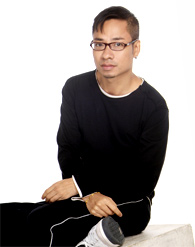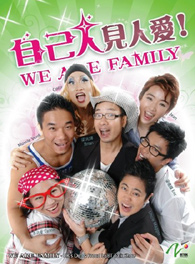Brian Leung Siu Fai’s has long been the gay voice known to Hong Kong’s Cantonese speaking tongzhi (LGBT) community, though the language barrier here in Hong Kong means that he is far less well known to the small minority of exclusively English speakers, and of course to the world beyond, than he deserves. Not that his English is anything but perfect, which it is, it’s just that he doesn’t relish broadcasting in it. I met him at the Fringe Club one late afternoon to find out about his life and work, and in some small measure to try to correct the lack of knowledge about him among the linguistically challenged. When I met him, he was wearing his trademark baseball cap, though this time with tie (check out the photos you can find of Brian online and you’ll find him behatted in most of them!).

Hong Kong itself isn’t large enough to generate enough news or interest on such a regular basis, so Brian also takes information from across the world, gives it a local flavour and puts it out on the Hong Kong air. A lot of this comes from gay blogs across the world, like queerty.com, afterelton.com or the lesbian blog, afterellen.com. His show goes out live on the net as well as across the airwaves, and its extensive archive is available at www.rthk.org.hk. He has a different guest every week and finds it a bit of a challenge sometimes to find new people. The show being radio rather than television helps the shy, who would otherwise, in some cases, refuse to have their faces shown, but sheer lack of numbers means that many of the guests are either not tongzhi themselves or are tongzhi who have yet to admit to being so. Music celebrities and stars of the entertainment industry will happily come on Brian’s show and talk of fashion and art but not about themselves. That’s still taboo here, though Brian has noticed that it’s all getting steadily easier as the years go by. The younger generation is far happier to talk about themselves, “it’s even become fashionable”, he says.
Listeners come from all walks of life and are both straight and gay, and all across the world now that the power of the net is universal. Brian has had responses from all over, from Canada, from Auckland in New Zealand, from Chicago and London, as well as from the closer-to-home Guangzhou. Many of his listeners are from the Chinese diaspora wherever it has settled, who are happy to listen to a programme in their own language about the place they often still regard as home. Most of the reactions Brian has had have been positive, though in the early days the show attracted some unjustified complaints, which appear to have been a concerted effort of some local fundamentalist Christian groups. RTHK maintained its cool and, apart from adding a ritual disclaimer and warning at the start of each show, continued to give Brian absolute editorial freedom. They have maintained this policy since inception. Brian admits to having been staggered when they approached him to run the programme in 2006. “It was the last thing I had expected could have been possible,” he comments. RTHK were widening their reach at the time and expanding into niches away from the usual remit of commercial radio. It was the time of Brokeback Mountain’s explosion into local cinemas. A gay programme fitted and felt right, and RTHK knew Brian from his two decades of presenting programmes in Hong Kong; they were confident he could be trusted ‘to know where the limits were’ as he puts it. At first, Brian thought it would just be an experimental three months’ run; three years on it continues to flourish.
Aside from entertaining and informing the tongzhi community, one of Brian’s missions is to reach out to heterosexual people who have little or no knowledge of anything queer, to reach into a lot of different layers in society which would otherwise never knowingly meet a gay person or who would otherwise sit secure inside an unbreached fastness of their own homophobia. He aims to make gay life more ordinary in some ways, more interesting in others, and has found in some very strange ways over the years that his message does get across. A straight cab driver recognised his voice one day and began to talk about the programme, telling Brian that he had recommended to a female passenger he was carrying, who was sitting depressed and crying in the back seat, and obviously distressed about her sexual orientation, that she should listen to the show so that she could ‘come out’ (and these two magic words he actually said in English!).
RTHK’s trust in Brian was not earned lightly. He has been presenting programmes since he graduated from Hong Kong’s Baptist University (where he’d studied sociology) in 1986. He worked for many years as a disc jockey and established a huge international repertoire of modern commercial and independent music of all styles. Over the years he’s worked as music director in all three of Hong Kong’s radio stations, RTHK, Commercial Radio and Metro Broadcast, the latter a funky new station at the time (about 1990) housed in a transparent studio in the heart of a Hung Hom shopping mall. As Hong Kong’s music industry fell into decline in the 1990s, and local stations aped American and British practice, more and more chat intruded into the music, and what was left of the music got less and less diverse. Hong Kong’s three radio stations share only twelve licensed channels between them, leaving not a great deal of space for innovation. “I’m totally for opening the waves for different companies”, Brian adds, “There’d be a public for a wider range of programmes and it could be commercially viable.”
But it hasn’t happened yet and wasn’t so then. At the time, Brian saw a better future outside radio and took over as Managing Director of the Hong Kong office of Taiwan record company Rock Records, where he stayed for three years. Even there he was not immune to what was crippling the industry, as pirate CDs decimated profits, so he decided to leave the industry in 2000 and set up his own web production company, So Corporation, earning revenue from things like editorial productions for some local portals. This enabled him to fulfil a personal dream, and, emulating sites such as gaybc.com, he established GayStation.com.hk, the first gay netcast in Hong Kong, indeed in all of Asia. This was a brand new here, a testing, if not exhausting, concept running 2-hour live shows every night. Programmes were on any aspect of gay life: counselling, hangouts, lifestyle, whereabouts, religious faith, sexuality. Each night heard a different set of topics, agony aunt, chat, interviews, all in Cantonese and broadcast from Brian’s website offices in Austin Road. He added a dating site, Member2.com, in 2004. But after about three to four years of success, the IT bubble burst and Brian’s company started to lose work, eventually reaching the point at which it could no longer support GayStation, which closed in 2004. Not everything was lost, though, as a smaller scale forum survives on the site to this day. After this, Brian spent a couple of years hosting a programme on Metro Broadcast and working as General Manager for a media company in China, Singshine Communications, for whom he later became programme director for one of the Guangdong channels. He found the Chinese completely pragmatic about his sexual orientation.

“Has gay broadcasting a future here?” I asked him. “So far, it’s just me,” he replies, “apart from the volunteer netcasts such as gayradio.hk and gdot.tv. In Daffyd’s (of Little Britain) words, I’m like the only gay in this village!” Yet he’s optimistic about the way trends are leading. Channels are now proliferating, radio and mainstream TV have been joined by pay TV and digital, and this, he believes, will drive them to look for niche markets. He’s still got hopes of a 24/7 gay channel for Hong Kong. “Would that be too much?” he questions himself, “And maybe anyway we shouldn’t be aiming at a ghetto.”
Looking back, Brian views his gay broadcasting as a long series of episodes of coming out in public. Despite his prominence in the community and the importance his voice has within it, he doesn’t see himself as a gay activist, more of a “gay media person”.
“Things are very different now from when I started in 1987. Coming out for the younger generation is no longer a big thing, but many celebrities remain content – for career reasons – to live in the glass closet. A famous local singer, for instance, will speak in private of being gay but will never admit it to the media. He doesn’t want to be labelled. He wants his music to travel farther, and in Hong Kong still the public is not educated enough to separate the caterer from the catering”, he laughs. For him, “coming out is a lifelong endeavour. It’s been therapeutic to do it on radio,” he confesses, “it’s been a good journey.” One which is, to the benefit of Hong Kong, a long way from being over yet.











 Printable Version
Printable Version


















Reader's Comments
Good luck to you Brian.
Please log in to use this feature.